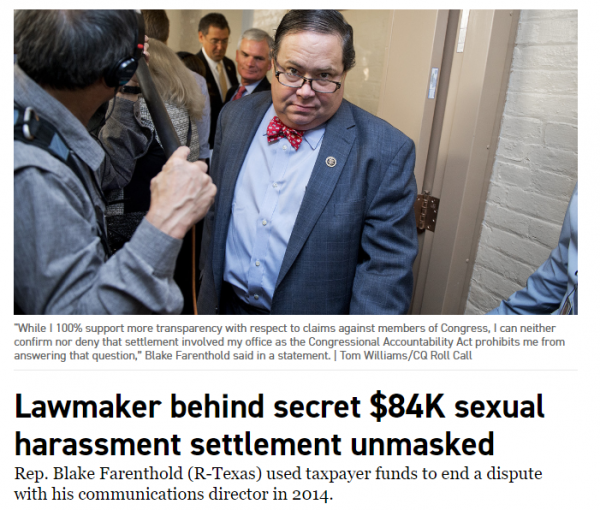Congress Finally Passed a Bill to Address its Sexual Harassment Problem

Last week, in a rare instance of bipartisanship and doing its job, Congress passed a bill — and it didn’t make things worse!
Congress passed the Congressional Accountability Act of 1995 Reform Act (CAA Reform Act) to fix its broken system for addressing sexual harassment and assault in its workforce. It was a long time coming. The President (the same president accused of sexual assault) still has to sign it. But a year after #MeToo, Congress has finally taken some action to address sexual harassment and assault in the legislative workplace, and its work is just beginning.
Congress Before #MeToo
Congress last tried to address its rampant harassment problem more than 20 years ago with the Congressional Accountability Act of 1995 (CAA). The CAA made civil rights and workplace laws that other employers follow applicable to Congress for the first time. But the CAA was designed to protect Congress, instead of the vulnerable individuals who risked their jobs and safety to report harassment, assault, or discrimination by powerful people.
Under the CAA there was a lengthy process for making and resolving a complaint, no supports for survivors, little accountability for members, and no incentive to change their behavior. Until very recently, sexual harassment policies and training weren’t mandatory for members or their staff. There’s no central HR office; the CAA established the Office of Compliance (“OOC”) to help members and staffers understand their rights and responsibilities, but its authority was very limited, and as a 2017 letter from former staffers noted, many of them weren’t even aware of it.
When someone did go to OOC for help, they had to go through a complicated process that required 30 days of counseling and a 30-day mediation period. If the complaint wasn’t resolved, individuals had to wait another 30 days before they could go to court. And in cases where members were alleged to have committed harassment and settled a claim, they didn’t pay the confidential settlements themselves; the taxpayers did, out of special U.S. Treasury fund. It’s surprising anyone ever came forward to report harassment and assault. That changed with #MeToo.
Starting in October 2017 former staffers and members of Congress shared their own experiences, including Rep. Jackie Speier, who had been trying to reform the CAA for years. A number of members of Congress resigned or retired early after revelations about inappropriate conduct and sexual harassment, and media reports detailing numerous settlements paid with taxpayer money.

And it wasn’t just Congress; all over the country, legislators, staff, and lobbyists spoke up about a pervasive culture of harassment and assault in statehouses, and the lack of accountability for elected officials.
Waiting Until the Last Minute
Last November, the House introduced a bill to address these issues, and with bipartisan leadership passed a bill in February to make members accused of harassment and discrimination personally responsible for reimbursing taxpayers for settlements of such claims. The bill also made important changes to the claim process to support survivors, and required transparency measures, like reports to Congress about the number of claims, settlements, the amounts, and the relevant offices.
At the same time, the House passed two resolutions, requiring anti-harassment and anti-discrimination training for all Members and staff, and requiring each House office to adopt workplace anti-discrimination and anti-harassment policies. The House also created an Office of Employee Advocacy to provide House employees with free legal assistance and representation.
But the Senate didn’t go as far. While it also passed a resolution requiring anti-harassment training for Senators and staff, the bipartisan Senate bill, passed in May, didn’t include the same strong reforms as the House, especially regarding accountability for members. We called them out and urged the House and Senate to work out a compromise that adopted the changes in the House bill.
It’s no surprise that the biggest sticking point in negotiations over the last several months was member liability and responsibility for reimbursing taxpayers. With time running out in this Congress, they finally struck a deal at the last minute.
What the CAA Reform Act Does
The compromise bill is a major improvement over the status quo; it makes meaningful changes to the CAA’s claim reporting and resolution process that protect workers, and provides them with more information and support. But while it also increases accountability for members and transparency, it falls short in some important ways.
- Protects more workers. In addition to employees, current and former interns, detailees, fellows, pages and other legislative staff are now protected.
- Provides initial review of claim. Previously, OOC had no authority to conduct an investigation into a claim, so there was no factfinding unless the claimant asked for a hearing. Now, once a claim is filed, a hearing officer conducts a “preliminary review” to examine the factual, legal and other issues surrounding the claim and issues a report on its findings. The claimant can file a lawsuit before the review is complete or after.
- Makes mediation optional. Individuals are no longer required to go to through 30 days of counseling and 30 days of mediation. Mediation is still an option if both sides ask for it.
- Provides a free confidential advisor for staff. Under the old system, if individuals needed legal advice, they had to hire an attorney. Now, the “confidential advisor” can explain the claim process, assist with drafting a claim, and advise individuals throughout the process and resolution, as long as the claimant is not represented by an attorney. The House still has its own office providing free legal representation to House employees.
- Holds members accountable for harassment and retaliation, but not other forms of discrimination. The bill requires members (and former members) to reimburse taxpayers for awards and settlements relating to claims of harassment and/or retaliation. While the process for requiring reimbursement is more straightforward for House members, the bill created a separate Senate Ethics Committee process to review settlements to determine whether a Senator must reimburse.
- Mandates climate surveys. All offices covered by the CAA have to conduct climate surveys on workplace culture.
- Requires public reporting. The bill requires annual public reports with data on awards and settlements, the amount, and the relevant office to ensure accountability.
While this bill is a significant step forward, the work isn’t over. For instance, members should be required to reimburse taxpayers for settlements of discrimination claims too. And there’s still a lot of work to do to address harassment and other forms of discrimination in all kinds of workplaces across the country, as highlighted by #MeToo.
We were proud to work with a number of advocacy groups over the last year on this effort, including the Leadership Conference on Civil and Human Rights, the ACLU, Public Citizen, and Equal Pay Today! Most of all, we’re thankful to the current and former staffers, including those at Congress Too and the Purple Campaign, who risked their jobs and careers to speak up and demand change more than a year ago.




